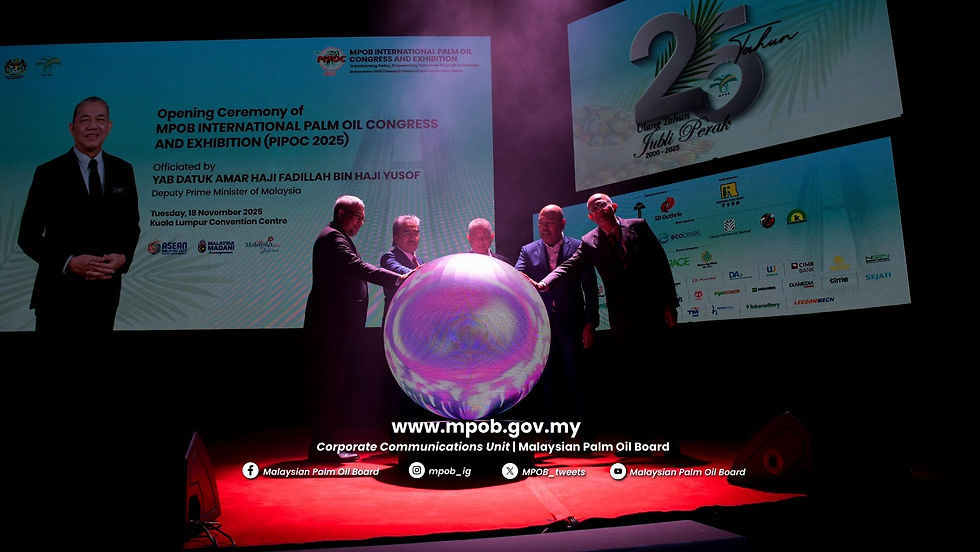Navigating Challenges and Solutions in the Global Vegetable Oils Supply Chain
- Sep 29, 2023
- 3 min read

Vegetable oils, the fastest-growing food commodity, continue to face an ongoing challenge of meeting the escalating high demand that increasingly outstrips supply. Climate change impacts and geopolitical developments pose significant challenges that require collaboration and partnership among producers to mitigate potential supply constraints that could disrupt food and energy security.
The Council of Palm Oil Producing Countries (CPOPC) and the Indonesian Palm Oil Association (GAPKI) co-organized the 2nd Sustainable Vegetable Oils Conference (2nd SVOC) to address immediate challenges and deliberate on measures to enhance future resilience in providing sustainable vegetable oils. This conference took place in Mumbai, India, aligning with the G20 to highlight India as a major consuming country, aiming to strengthen cooperation on sustainability, food and energy security, renewable energy, resilience, inclusive food value chains, and the circular economy.
Leading stakeholders in the vegetable oils industry discussed the global challenges in the vegetable oils supply chain and emphasized the importance of strengthening the foundation for future communication and cooperation among global stakeholders. They sought to foster an alliance for common interests in the vegetable oils sector.
Representatives from the main producing countries (Indonesia, Malaysia, India, China, and the EU), international organizations (such as the Food and Agriculture Organization and the Intergovernmental Panel on Climate Change), major multinationals, as well as growers, discussed the pivotal role of vegetable oils. This role was emphasized as a fundamental tool for humanity, both for edible consumption and various applications, including in achieving the United Nations Sustainable Development Goals (SDGs).
Dr. Laura Suazo, the Minister of Agriculture and Livestock of Honduras, expressed her concerns about the challenges faced by Honduran small producers and extraction plants due to recent changes in the EU's import policy. She announced the government's plan to launch the State Policy for the Agri-Food Sector of Honduras 2023-2043, which proposes several strategies, including addressing the management of pests and diseases, land invasions, genetic improvement, and financing.
Dr. Jerry Sambuaga, the Vice Minister of Trade of the Republic of Indonesia, reiterated the conference's theme, "Advancing Sustainability," highlighting two critical aspects concerning palm oil and its global contribution. Firstly, palm oil can meet the global demand for sustainable vegetable oil, but the negative image associated with its production must be addressed. Secondly, palm oil and the SDGs are inseparable, as the former underpins the attainment of the latter.
Dato' Hj. Mad Zaidi bin Mohd Karli, the Secretary-General of the Ministry of Plantation & Commodities of Malaysia, underscored the steady growth of the world population and the increasing pressure to meet global demands for food and fuel. He emphasized that the key question to confront is not about replacing palm oil but rather acknowledging how sustainable palm oil can efficiently, economically, and sustainably meet this demand. Palm oil has proven to have positive impacts on global food security due to its high productivity, wide range of applications, and its ability to enhance food security.
Dr. Shatadru Chattopadhayay, Managing Director of Solidaridad Asia, emphasized the need for the EU to create three essential elements for inclusive implementation of the EU Deforestation Regulation. These elements include implementing an inclusivity quota, guaranteeing a specific percentage of palm oil imports from smallholders in Indonesia and Malaysia, supporting oil palm smallholders through pre-financing, technical assistance, and a guaranteed market for carbon credits, and aligning national mandatory sustainability standards like the Malaysian Sustainable Palm Oil (MSPO) and the Indonesian Sustainable Palm Oil (ISPO) with the EUDR.
Dr. Rizal Affandi Lukman, the Secretary-General of CPOPC, recalled the role of palm oil in providing new and innovative approaches, ideas, and measures to ensure the resilience and prosperity of the global vegetable oil sector in the longer term. He emphasized that for major consumers like India, palm oil should complement domestically produced vegetable oils, not compete with them, to ensure food security and energy security. Without a doubt, palm oil is a crucial feedstock in the renewable energy mix, with the potential to play a pivotal role in supporting the implementation of the Global Biofuel Alliance, established during the 2023 G20 summit.
During the conference, speakers emphasized the looming deficit in the global vegetable oil market due to rising demand, supply constraints, and geopolitical factors. India's increasing edible oil consumption necessitates ramping up domestic palm oil production, while discussions focused on enhancing China's vegetable oil supply and demand dynamics. Sustainable palm oil production emerged as a promising solution to efficiently address global food needs, incorporating innovation, mechanization, and environmental adaptability. Additionally, strategies to improve inclusivity and resilience in palm oil supply chains were highlighted, along with the need to address global hunger through transformative, sustainable food systems. The European Union's Deforestation Regulation presents both challenges and opportunities, urging collaborative efforts and shared governance to drive sustainable practices. Lastly, speakers stressed the significance of effective carbon uptake, emission reduction, and climate adaptation for sustainable palm oil production.









